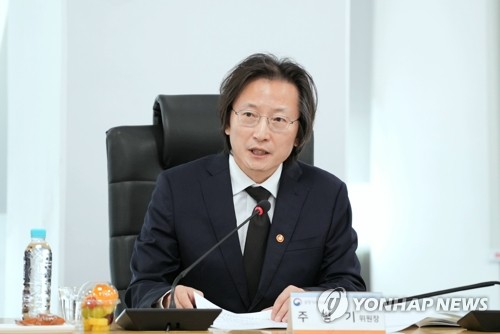(Seoul=Yonhap Infomax) Pil Joong Jeong –
Joo Byung-ki, Chairperson of the Fair Trade Commission (FTC), stated that it would be preferable to pursue temporary regulatory easing through special legislation rather than amending the Fair Trade Act, South Korea’s main antitrust law, in response to a recent ruling party proposal allowing holding companies’ sub-subsidiaries to establish special purpose companies (SPCs) for investment in advanced strategic industries.
Joo emphasized that any relaxation of the separation between industrial and financial capital—a core principle in South Korean corporate governance—should not undermine its fundamental framework. He also confirmed that collusion among companies had occurred in sectors such as pork and sugar, and that the FTC is currently reviewing these cases.

Appearing on MBC Radio’s “Kim Jong-bae’s Focus” on the morning of the 25th, Joo said, “There is no need to amend the Fair Trade Act itself,” adding, “There are special laws being prepared, such as the Semiconductor Special Act and others.”
He continued, “If companies face difficulties in raising funds due to certain regulations, these can be addressed through special legislation. Since the Fair Trade Act is a general law, it is more appropriate to make temporary changes via special laws rather than amending the general law itself.”
The ruling party’s proposal to amend the Fair Trade Act has drawn criticism that it would primarily benefit SK Group, as only SK currently operates under a holding company structure. Recent agreements between OpenAI, Samsung Electronics Co.—South Korea’s largest company by market value—and SK Hynix Inc. to invest in high-bandwidth memory supply require significant capital expenditure, and some have argued that SK would be the main beneficiary. However, Joo noted, “Other companies besides SK could also benefit.”
On the issue of easing the separation between industrial and financial capital, Joo reiterated that any changes should not undermine the core principle, citing ongoing concerns about the concentration of economic power among large conglomerates (chaebol). He said, “We maintain an abnormal advanced economy where, on average, a single owner family controls more than 40 affiliates, passing them down to the second, third, and fourth generations. This hinders our leading companies from focusing on incentives for technological innovation and competitiveness.”
Joo also suggested that there are alternative ways to stimulate investment without relaxing the separation principle, such as resolving regulatory barriers that prevent the National Growth Fund from investing in certain areas.
He added, “South Korea plays a key role in the global supply chain for memory semiconductors within the AI ecosystem. If companies like Google and OpenAI deepen their cooperation with our firms, the growth potential and business outlook for our companies will improve, making it easier for them to secure funding independently.”
Regarding allegations of collusion among companies in the sugar and pork sectors, Joo confirmed that the FTC’s investigation found evidence of price-fixing. “Our investigation has determined that there was price collusion among companies in pork and sugar. The final determination of illegality and the level of sanctions will be decided through the review process,” he said.
Joo clarified that the FTC’s collusion investigations will focus primarily on raw materials rather than processed goods such as confectionery. “We believe it is important to focus on raw materials. If there is evidence of collusion in confectionery or the broader food industry, we will investigate, but raw materials appear to be the main concern,” he said.
joongjp@yna.co.kr
(End)
Copyright © Yonhap Infomax Unauthorized reproduction and redistribution prohibited.

